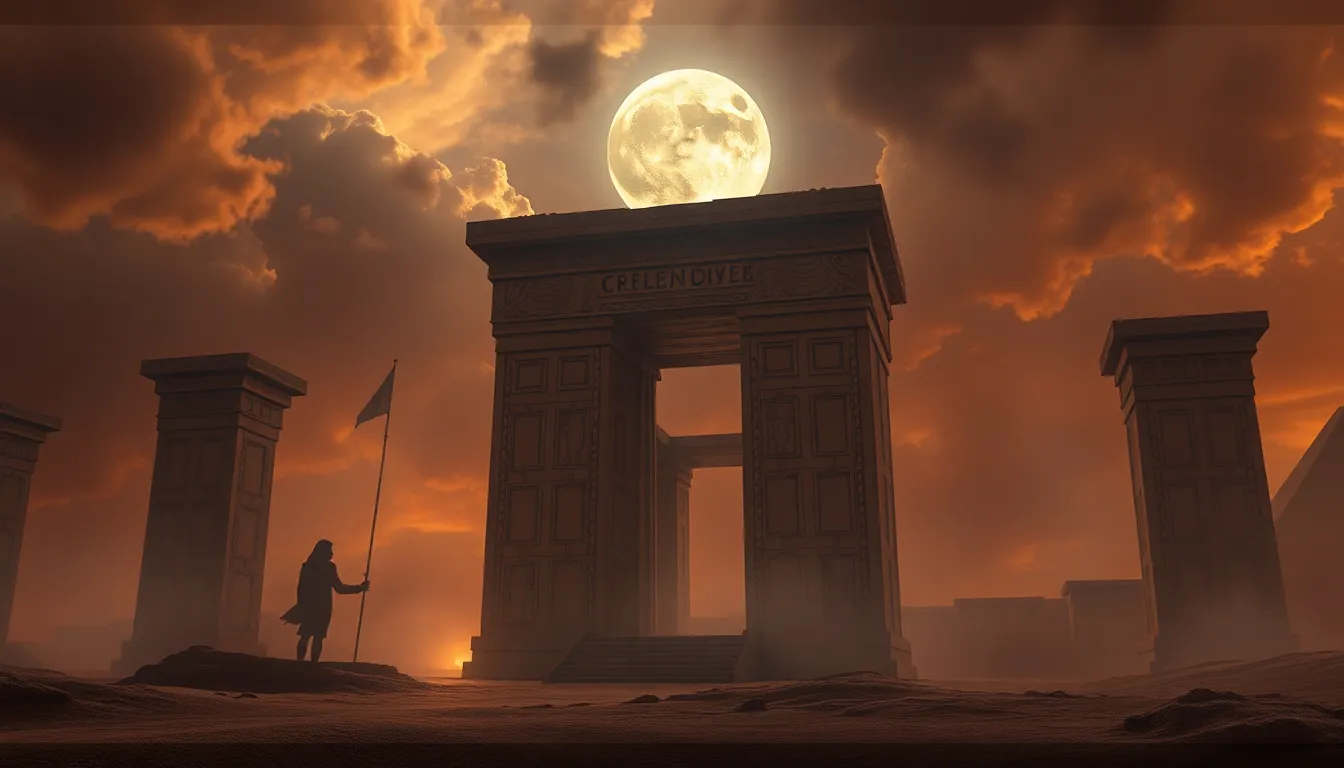The Prophecies of the Ancient Egyptians: What Did They Foretell?
I. Introduction to Ancient Egyptian Prophecies
The ancient Egyptians are renowned for their rich culture, profound spirituality, and complex belief systems. Among these, the concept of prophecy held a significant place. Prophecies were not merely predictions; they were seen as divine messages, often communicated through dreams, visions, or through the mouths of priests and seers. In a society that deeply intertwined religion with daily life, these prophetic narratives shaped the worldview of the Egyptians and their understanding of fate and the divine.
Religion and spirituality were foundational in the ancient Egyptian culture, giving rise to a narrative framework within which prophecies were interpreted. The gods were believed to communicate their will through various means, and understanding these messages was crucial for the health and stability of the state.
II. Historical Context of Ancient Egyptian Prophecies
To understand the prophecies of ancient Egypt, one must first consider the historical context of their civilization. The timeline of Ancient Egyptian civilization spans over 3,000 years, from the early dynastic period around 3100 BCE to the conquest by Alexander the Great in 332 BCE.
- Early Dynastic Period: Establishment of the first pharaohs and the unification of Upper and Lower Egypt.
- Old Kingdom (c. 2686–2181 BCE): Known as the “Age of the Pyramids,” marked by prosperity and monumental architecture.
- Middle Kingdom (c. 2055–1650 BCE): A period of cultural and literary flourishing.
- New Kingdom (c. 1550–1070 BCE): Egypt’s empire reached its zenith, marked by military conquests and extensive trade.
Major historical events, such as invasions, natural disasters, and dynastic changes, significantly influenced the prophetic beliefs of the time. Prophecies often served as political tools, legitimizing the rule of pharaohs or predicting the rise and fall of dynasties.
III. Key Sources of Egyptian Prophecies
Several key texts provide insight into the prophetic beliefs of the ancient Egyptians. Among these, the Pyramid Texts, Coffin Texts, and the Book of the Dead are the most significant.
A. The Pyramid Texts: Origins and significance
Dating back to the Old Kingdom, the Pyramid Texts are among the oldest religious writings in the world. These texts were inscribed on the walls of royal tombs and served as spells and prayers meant to assist the deceased in the afterlife. They often contained prophecies regarding the afterlife and the divine judgment of the soul.
B. The Coffin Texts and their prophetic implications
Emerging during the Middle Kingdom, the Coffin Texts expanded on the themes found in the Pyramid Texts, making them accessible to non-royal individuals. These texts included spells that foretold the journey of the soul after death, emphasizing the importance of moral conduct in life.
C. The Book of the Dead: Afterlife prophecies and their meanings
The Book of the Dead is a compilation of spells and guidelines intended to help the deceased navigate the afterlife. It contains prophecies regarding judgment in the Hall of Ma’at, where the heart of the deceased would be weighed against the feather of truth, determining their fate.
IV. Major Prophetic Themes in Ancient Egyptian Literature
Ancient Egyptian literature is rich with themes that reflect their understanding of destiny and fate. Some of the major prophetic themes include:
- The fate of rulers and dynasties: Prophecies often foretold the success or downfall of pharaohs, reflecting the belief that rulers were intimately connected to divine favor.
- Predictions of natural disasters and cosmic events: Many texts contained warnings about floods, droughts, or celestial phenomena, believed to be signs from the gods.
- Prophecies regarding the afterlife and judgment: These narratives provided guidance on ethical living and the importance of maintaining harmony with the divine order.
V. Notable Prophets and Seers in Ancient Egypt
Throughout ancient Egyptian history, several notable figures are associated with prophecy. One such figure is Imhotep, an architect and healer who was later deified as a god of wisdom and medicine. His insights and predictions were highly regarded.
The role of priests as intermediaries was also crucial in delivering prophecies. They interpreted oracles and dreams, serving as channels between the gods and the people. Their authority was built on their extensive knowledge of sacred texts and rituals.
VI. Prophecies about Foreign Powers and Invaders
Ancient Egyptian prophecies often included predictions about foreign powers and invaders. These prophecies reflected the Egyptians’ concerns about their security and sovereignty.
- Predictions concerning the rise and fall of neighboring civilizations: Prophecies sometimes foretold the ascendance or decline of rival states, influencing the political landscape of the region.
- The impact of prophecy on military decisions and statecraft: Rulers often consulted prophecies before embarking on military campaigns, believing that divine favor could dictate the outcome of battles.
VII. Case Studies of Specific Egyptian Prophecies
Several specific prophecies stand out in Egyptian history:
A. The prophecy of the fall of the Old Kingdom
Historical evidence suggests that the decline of the Old Kingdom was foreshadowed by prophecies warning of internal strife and divine displeasure, leading to the eventual collapse of centralized power.
B. The prediction of famine and its historical occurrences
Famine was a recurring theme in Egyptian prophecies. Several historical accounts align with prophetic warnings about drought and crop failures, demonstrating the practical implications of these beliefs.
VIII. The Influence of Egyptian Prophecies on Later Cultures
Ancient Egyptian prophetic thought did not fade away with the decline of their civilization. Instead, it influenced later cultures, particularly during the Greco-Roman period.
- How Egyptian prophecies influenced Greco-Roman beliefs: Many Greek and Roman writers were fascinated by Egyptian religion and prophecy, often incorporating these elements into their own belief systems.
- The legacy of Egyptian prophetic thought in modern spirituality: Elements of Egyptian prophecy can still be seen in contemporary spiritual practices, where the themes of judgment and the afterlife resonate with modern audiences.
IX. Critiques and Interpretations of Egyptian Prophecies
Scholarly debates about the accuracy and validity of ancient Egyptian prophecies are ongoing. Some argue that prophecies are retrospective interpretations rather than true foresight.
The role of interpretation and context in understanding these prophecies is crucial. The cultural lens through which we view these ancient texts can significantly alter their perceived meaning and relevance.
X. Conclusion: The Enduring Legacy of Ancient Egyptian Prophecies
The prophetic beliefs of ancient Egypt were integral to their culture, influencing everything from statecraft to personal morality. These prophecies served as a means of understanding the world and the divine will, shaping the destinies of rulers and common people alike.
Today, the legacy of Egyptian prophecies continues to captivate the imagination, reflecting our ongoing quest for meaning and understanding of the forces that shape our lives.



